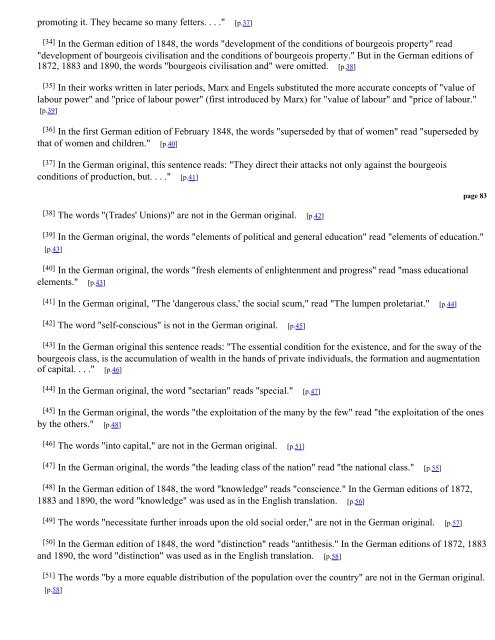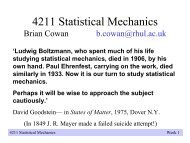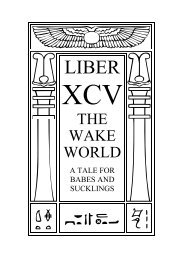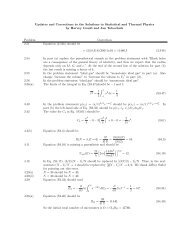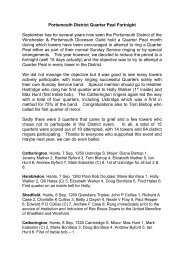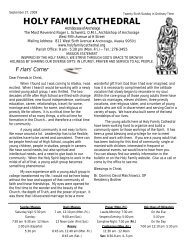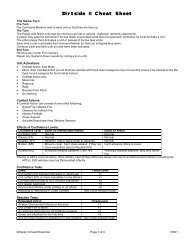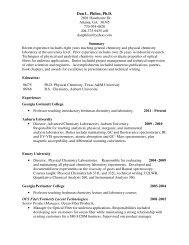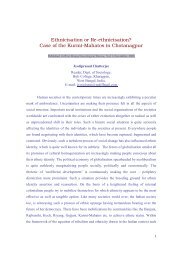Manifesto of the Communist Party - WebRing
Manifesto of the Communist Party - WebRing
Manifesto of the Communist Party - WebRing
Create successful ePaper yourself
Turn your PDF publications into a flip-book with our unique Google optimized e-Paper software.
promoting it. They became so many fetters. . . ." [p.37]<br />
[34] In <strong>the</strong> German edition <strong>of</strong> 1848, <strong>the</strong> words "development <strong>of</strong> <strong>the</strong> conditions <strong>of</strong> bourgeois property" read<br />
"development <strong>of</strong> bourgeois civilisation and <strong>the</strong> conditions <strong>of</strong> bourgeois property." But in <strong>the</strong> German editions <strong>of</strong><br />
1872, 1883 and 1890, <strong>the</strong> words "bourgeois civilisation and" were omitted. [p.38]<br />
[35] In <strong>the</strong>ir works written in later periods, Marx and Engels substituted <strong>the</strong> more accurate concepts <strong>of</strong> "value <strong>of</strong><br />
labour power" and "price <strong>of</strong> labour power" (first introduced by Marx) for "value <strong>of</strong> labour" and "price <strong>of</strong> labour."<br />
[p.39]<br />
[36] In <strong>the</strong> first German edition <strong>of</strong> February 1848, <strong>the</strong> words "superseded by that <strong>of</strong> women" read "superseded by<br />
that <strong>of</strong> women and children." [p.40]<br />
[37] In <strong>the</strong> German original, this sentence reads: "They direct <strong>the</strong>ir attacks not only against <strong>the</strong> bourgeois<br />
conditions <strong>of</strong> production, but. . . ." [p.41]<br />
[38] The words "(Trades' Unions)" are not in <strong>the</strong> German original. [p.42]<br />
[39] In <strong>the</strong> German original, <strong>the</strong> words "elements <strong>of</strong> political and general education" read "elements <strong>of</strong> education."<br />
[p.43]<br />
[40] In <strong>the</strong> German original, <strong>the</strong> words "fresh elements <strong>of</strong> enlightenment and progress" read "mass educational<br />
elements." [p.43]<br />
[41] In <strong>the</strong> German original, "The 'dangerous class,' <strong>the</strong> social scum," read "The lumpen proletariat." [p.44]<br />
[42] The word "self-conscious" is not in <strong>the</strong> German original. [p.45]<br />
[43] In <strong>the</strong> German original this sentence reads: "The essential condition for <strong>the</strong> existence, and for <strong>the</strong> sway <strong>of</strong> <strong>the</strong><br />
bourgeois class, is <strong>the</strong> accumulation <strong>of</strong> wealth in <strong>the</strong> hands <strong>of</strong> private individuals, <strong>the</strong> formation and augmentation<br />
<strong>of</strong> capital. . . ." [p.46]<br />
[44] In <strong>the</strong> German original, <strong>the</strong> word "sectarian" reads "special." [p.47]<br />
[45] In <strong>the</strong> German original, <strong>the</strong> words "<strong>the</strong> exploitation <strong>of</strong> <strong>the</strong> many by <strong>the</strong> few" read "<strong>the</strong> exploitation <strong>of</strong> <strong>the</strong> ones<br />
by <strong>the</strong> o<strong>the</strong>rs." [p.48]<br />
[46] The words "into capital," are not in <strong>the</strong> German original. [p.51]<br />
[47] In <strong>the</strong> German original, <strong>the</strong> words "<strong>the</strong> leading class <strong>of</strong> <strong>the</strong> nation" read "<strong>the</strong> national class." [p.55]<br />
[48] In <strong>the</strong> German edition <strong>of</strong> 1848, <strong>the</strong> word "knowledge" reads "conscience." In <strong>the</strong> German editions <strong>of</strong> 1872,<br />
1883 and 1890, <strong>the</strong> word "knowledge" was used as in <strong>the</strong> English translation. [p.56]<br />
[49] The words "necessitate fur<strong>the</strong>r inroads upon <strong>the</strong> old social order," are not in <strong>the</strong> German original. [p.57]<br />
page 83<br />
[50] In <strong>the</strong> German edition <strong>of</strong> 1848, <strong>the</strong> word "distinction" reads "anti<strong>the</strong>sis." In <strong>the</strong> German editions <strong>of</strong> 1872, 1883<br />
and 1890, <strong>the</strong> word "distinction" was used as in <strong>the</strong> English translation. [p.58]<br />
[51] The words "by a more equable distribution <strong>of</strong> <strong>the</strong> population over <strong>the</strong> country" are not in <strong>the</strong> German original.<br />
[p.58]


